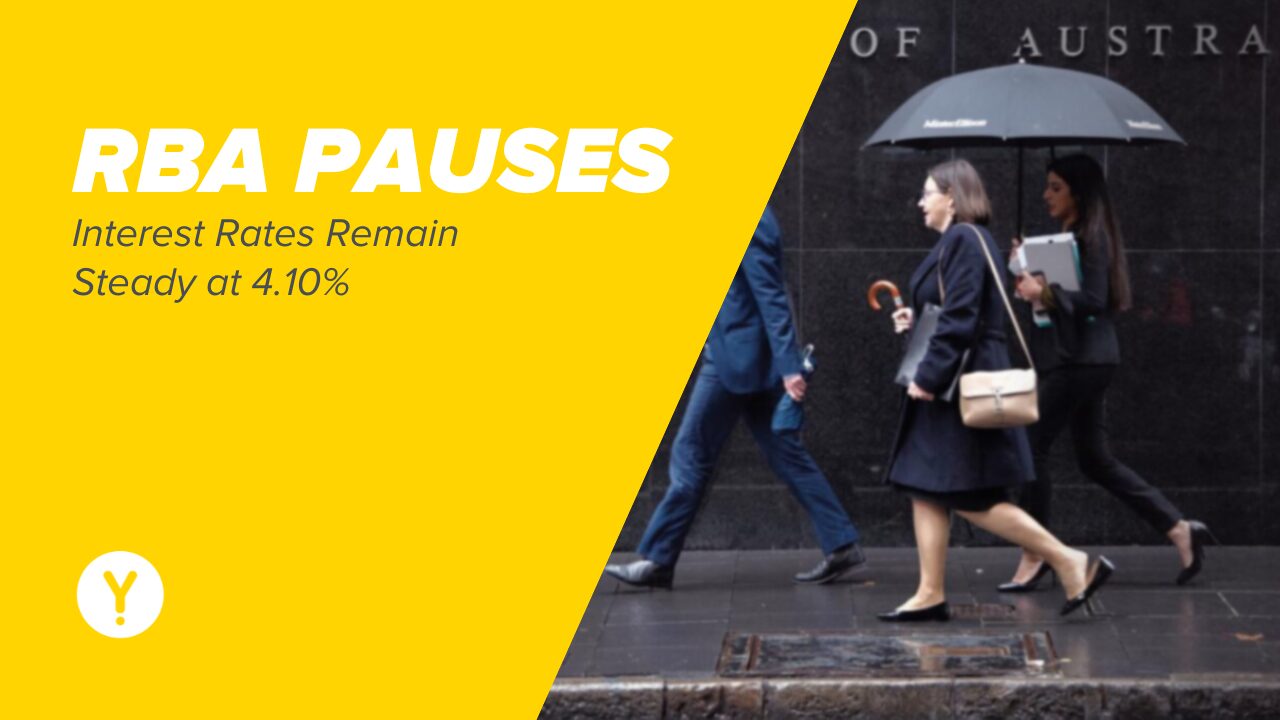In this article:

The cash rate is on hold for the third consecutive month as the Reserve Bank of Australia (RBA) Board held its monthly meeting in which it sets the official interest rate. The Cash Rate remains at 4.10%.
In its press release announcing the decision, the RBA Board stated that this pause will continue to give them time to assess the impact of record rate increases.
“Interest rates have been increased by 4 percentage points since May last year,” said the statement. “The higher interest rates are working to establish a more sustainable balance between supply and demand in the economy and will continue to do so. In light of this and the uncertainty surrounding the economic outlook, the Board again decided to hold interest rates steady this month.”
The RBA reiterated its determination to return inflation to a 2 – 3% range, but are more confident of this, “with output and employment continuing to grow. Inflation is coming down, the labour market remains strong and the economy is operating at a high level of capacity utilisation, although growth has slowed.”
“There are significant uncertainties around the outlook. Services price inflation has been surprisingly persistent overseas and the same could occur in Australia. There are also uncertainties regarding the lags in the effect of monetary policy and how firms’ pricing decisions and wages respond to the slower growth in the economy at a time when the labour market remains tight.”
September RBA Meeting Marks the End of an Era
The September meeting of the Reserve Bank of Australia (RBA) was one for the record books, marking the final meeting headed by Governor Philip Lowe. After a long tenure, Lowe is set to pass on the reins to Michelle Bullock from next month.
Lowe’s final meeting saw the Cash Rate remaining steady at 4.10%, with many predicting that rates have peaked. Only one of the big four banks, NAB, is predicting another rate hike, suggesting the cash rate will hit 4.35% in November with no more to follow.
As the torch is passed to Bullock in the coming month, keen eyes will be turned to whether the RBA will have shift in its approach to monetary policy.
Chatting on their monthly episode of Property Insights, Mark Bouris and Stephen Koukoulas reminded listeners that we still don’t have a clear view of how Michelle Bullock and the “new board” will function.
Bouris pointed out that the independent review of the RBA brought about a number of recommendations, but two key changes will be implemented from next year.
He said, “The review recommended two boards, one board for business-as-usual, day-to-day stuff. And the other board will be meeting 8 times a year to decide on interest rates (instead of 11).”
“So a monetary policy board as opposed to one that looks after printing banknotes and admin of staff,” Koukoulas replied.
Crucially, there is no word yet on who will be sitting on the new-look ‘monetary policy board’.
“Not going to solve” housing supply in the “short term”
The issue of rents and property prices continues to be a key concern for the RBA and Australians alike.
Despite rising interest rates and tighter lending policies, Australia’s property market continues its post-COVID rebound, with CoreLogic’s national Home Value Index (HVI) reporting a sixth consecutive monthly rise, up 0.8% in August.
CoreLogic Research Director, Tim Lawless, said that whilst the general trend in housing values is on the up, there’s a diverse mix of results across the country:
“Sydney has led the recovery trend to-date with a gain of 8.8% since values found a floor in January this year. Brisbane has also posted a strong recovery with values up 6.2% since bottoming out in February.
“At the other end of the scale, some other capital cities are better described as flat, with Hobart home values unchanged since stabilising in April, while values across the ACT have risen only mildly, up 1.0% since a trough in April. These are also the only two capital cities where advertised supply is tracking higher than a year ago, suggesting a rebalancing between buyers and sellers is a key factor contributing to the stability of values in these regions.”
When discussing the issue on Property Insights, Koukoulas said that he doesn’t think interest rate rises will solve anything because “the problem is ultimately we have a housing supply issue.”
“We need more houses and units coming onto the market, but that’s not going to be solved in the short term,” he said.
Bouris added that if you look at one of the major contributors to rising inflation, “services inflation is the thing that is out of control, that includes rents…we’ve always talked about rents and the under supply of property.”
“We’ve got a rent problem, it’s just going to keep going. So it’s going to continue to influence the inflation number for a while. And I don’t really see any outcome, I don’t see how they’re going to solve it for the moment.”
“Not in the short term. We’re not going to get a surge in new housing, all of a sudden; it takes a year or two to build that lead time to find a bit of dirt to build a house that someone can live in so it takes at least a year or so.”
Adding to this factor is that “we’re not in a normal market”, Bouris said.
“In a normal market, demand goes up, decreasing supply.”
“Demand is not necessarily increasing,” we simply have a lack of supply according to Bouris.
“In terms of assessing demand, the thing that creates demand is affordability. And affordability is out of control because we now assess people’s borrowing capacity at nearly 10%. So as a result of that we lend less, or we don’t lend at all. And therefore the demand curve is nowhere near where it was a year ago. But the supply curve has also dropped.”
How to stay ahead of the curve?
With tougher lending criteria, a fluctuating property market and a rising rate environment, now more than ever it pays to work with a mortgage broker.
Branch Principal of YBR Home Loans Edmondson Park, Natalie Dictado encouraged any borrower to do one thing: pick up the phone.
“It is never too late to just simply pick up the phone and see where you and your finances are, and what options there are for you out in the market,” said Dictado.
“The odds are if you haven’t picked up the phone and done a recent review, you’re not on the best product.”
“As brokers, we’re here to help the public and the community in finding a solution that can assist you in these tough times.”
“It’s what we enjoy doing, it’s what we’re trained to do and we’re professionals, so we can take that clunky research and process out of the way for you and let you focus on other things in life that matter.”
A mortgage broker can provide a broader perspective on your property journey, by taking a step back and assessing your short term needs and your long term goals. They’re able to plan and strategise with you for the long term, by marrying up your goals with a suitable lender and loan.
They can negotiate on your behalf, not just at the time of application, but throughout your mortgage term, possibly saving you thousands of dollars over the lifetime of your mortgage. If you’ve found yourself wondering whether your home loan is really the best option for you, or if you want to enter the property market with the support you deserve, reach out to us today.



